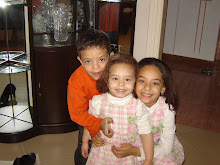
This is Dr. Cathy Schiano. She is not only my physician, but also a great friend. One of the things we share in common, is that we both have boys who suffer from ADHD. Her son, an adorable little monster, is younger than Hamza, but was also diagnosed with ADHD. As a mother and a Dr. I felt that she would have the most in depth thought about children and ADHD. The following is a Q & A between Dr. Schiano and myself.
WE: How early can ADHD be diagnosed in a child?
Dr. S: Onset 7 years. 50% meet Dr. criteria by age 4 with a male and female ratio of 5:1.
WE: What are some signs that parents and Dr. look for to recognize systems of ADHD in children?
Dr. S: The most obvious signs are:
*Short attention span
*Low frustration tolerance
*Impulsive
*Distractiblity
*Often hyperactivity
*Poor school performance
*Difficulty in peer relationships
*Parent/child conflict
WE: Once the signs become obvious, what is the next step that parents should take?
Dr. S: The first thing is to visit a family Dr. Parents should also speak to the teachers at school to have the child evaluated by a child study team, Or see a developmental specialist.
WE: Is there special testing to determine if a child has ADHD?
Not really. There is a the hyperactivity - inattentive scale that is used by doctors. For ADD alone one needs 6 out of 9 in the inattention criteria from the DSM-IV-r or 6 out of 9 for the hyperactivity. By the age of 7 a child must be monitored for 6 month and be noted in 2 settings. The first is:
Inattention (6 or >):
* Careless mistakes
* Difficulty sustaining attention
* Doesn't follow through or finish tasks
* Difficulty organizing tasks
* Avoidance of tasks that require sustained mental effort
* Loses things
* Forgetful
* Easily distracted
The second is:
Hyperactivity (6 or >):
* Fidgets
* Difficulty remaining seated
* Runs or climbs excessively
* "Driven as if by a motor"
* Talks excessively
* Blurts out answers
* Difficulty awaiting turn
* interrupts others
WE: In your expert opinion, do you feel that ADHD is over diagnosed? And Why?
Dr. S: No I do not. It is a very prevalent problem. Only 3-5% of school aged kids are diagnosed with ADHD.
WE: What are the best treatments for ADHD?
Dr. S: There really isn't just one type of treatment, sometimes a combination of treatment is required for certain children. There are the medicinal medication of stimulants and non-stimulants. Behavioral therapy, like reinforcing good behavior and stopping bad behavior quickly. Setting goals, sometime using charts can help the child and the parent in setting goals. Anger training is also sometimes necessary. Finally a behavioral tech., IEP in school.
WE: There is so much controversy regarding medicating children who are diagnosed with ADHD. Are you for or against medication when it comes to ADHD?
Dr. S: Medication are not without risk. Stimulants can be addictive, cause appetite and growth problems. There is also the possibility of suicide in a small number of patients. On the other hand, not medicating a child can result in risk of future drug abuse, depression, social isolation, failure in school, parental abuse, and poor self esteem. Some other disorders may develop, like mood disorder oppositional-defiant disorder and conduct disorder.
WE: In your opinion, what is the best drug medication out there now for ADHD?
DR. S: New Non-stimulants like strattera are more recommended. Their extended release works best as medication goes.
WE: Do you believe that ADHD can be genetic?
Dr. S: 50% of children have parental ADHD, Though overall the causes is multi factorial.
WE: As a mother and Dr. what advice would you give to parents with children who have ADHD or showing sign of ADHD?
Dr. S: The best advice parents need is regular support and advice. They also need to establish regular contact with teachers and school staff each year. Joining a support group or looking for blogs like this one can be great help and support for other parents and the children.
I would like to thank Dr. Schiano for this Q & A and also share this video on a medication check list. This is a great video that I believe every parent with a child diagnosed with ADHD should watch. Not only is it for medication but a check list that can monitor any kind of treatments.






